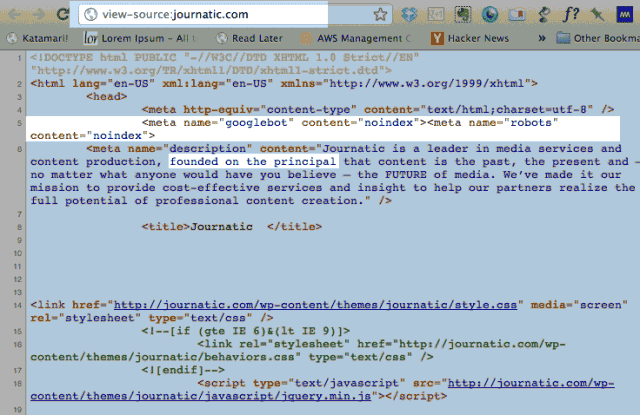This American Life devoted 23 minutes reporting on Journatic, a journalism outsourcing company that did its darndest to stay hidden. It’s a great piece, produced by Sarah Koenig, that’s worth a listen even for non-journalists. And Anna Tarkov, for Poynter, has a piece that adds more detail about this “local news” operation.
Both Koenig and Tarkov remark on how difficult it was to find first-hand information on Journatic:
If you’ve never heard of Journatic, that’s kind of the idea. The company, which was founded in 2006, has a website that doesn’t appear on at least the first five pages of Google search results. Job openings, often posted on Craigslist or JournalismJobs.com, once mentioned the company’s name, but no longer.
The technical part of the “why?” is easy; check out Journatic.com‘s metadata:
If I were a Tribune company exec in charge of innovative digital news initiatives, I’d ask: “Why does this innovative online news company have code that eliminates it from Google search results? Have they not yet gone through SEO PowerPoint seminars?” (note that the meta-description appears to have been handled by an outsourced copy-editor). Unfortunately, there aren’t many news company execs who even know what that question means or entails. In Tribune’s case, maybe asking that “geeky” question would’ve prevented the need to answer this ethics question today.

Pingback: My adventures in Journatic’s new media landscape of outsourced hyperlocal news | BizNax
Pingback: My adventures in Journatic’s new media landscape of outsourced hyperlocal news | Ryan Smith — Mask-Africa Renewable Energy
Pingback: Journatic and the newspapers of the future at B12 Solipsism
Ha, that’s funny! They were on to our tricks here in Beverly Hills. For years the city had embedded ‘no follow’ code in its robots.txt file – one of only two of the 88 cities in Los Angeles County to do so, I let City Hall know. Once I called it out, of course, it became an “oversight” and was blamed on the website contractor.
Presumably ‘no follow’ was used to prevent indexing of PUBLIC documents accessible though the site. But my city doubled down by also generating most of those documents as image-based PDFs, meaning that they weren’t easily indexed in any case. So much for ‘public.’
Pingback: The Week That Journalism Got Meta | Techli